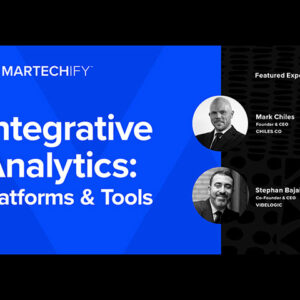Revolutionizing Decisioning in Marketing and Sales
Understanding the evolution of martech
The marketing technology (martech) landscape is akin to a bustling metropolis, constantly expanding and evolving with new tools, strategies, and paradigms. In today’s digital era, where technology is the backbone of marketing success, staying ahead of these changes is not just beneficial—it’s imperative. Expert insights serve as beacons in this dynamic realm, offering invaluable guidance to marketers striving to maximize their martech stack’s potential and stay competitive in an ever-evolving market.
Martech’s influence on marketing: The fusion of tech and creativity
One of the most prominent and transformative shifts in martech is its profound impact on marketing teams. Martech is no longer just about tools; it’s about the fusion of technology and creativity, blurring the traditional lines between the two domains. As martech tools become increasingly accessible and sophisticated, organizations must pivot towards strategies that prioritize field enablement, training, and upskilling. This strategic shift ensures the optimal utilization of new technologies, empowering marketers with a blend of creative skills and technological acumen. This metamorphosis can potentially transform marketers into data-savvy professionals, akin to data engineers, capable of navigating complex data landscapes and deriving actionable insights.
Martech stack optimization: Unlocking efficiency and integration
In an era where martech spending outpaces investments in human resources, organizations face mounting pressure to rationalize their martech stacks. The key lies in streamlining and consolidating martech tools to achieve seamless data integration and activation across diverse marketing channels. This optimization not only enhances operational efficiency but also aligns with the overarching goal of becoming a data-driven enterprise. By eliminating redundancies and implementing a cohesive martech ecosystem, organizations can leverage data more effectively, driving informed decision-making and delivering impactful customer experiences.
The road ahead: Addressing privacy, personalization, and compliance
Amidst the martech revolution, marketers grapple with the dual challenge of balancing data utilization for personalization and navigating stringent data privacy regulations. With the impending demise of third-party cookies and tightening privacy laws, measuring campaign success while safeguarding consumer data has become paramount. However, this challenge presents an opportunity for innovation and strategic adaptation. Leveraging emerging technologies such as AI and machine learning, marketers can harness customer data ethically and responsibly. By employing advanced analytics and predictive modeling, they can create optimized customer journeys and personalized tactics that drive engagement and conversions. This approach ensures a harmonious balance between personalization and privacy compliance, fostering trust and loyalty among consumers.
Key strategies for martech success:
- Embrace continuous learning: Invest in ongoing training and upskilling programs to empower marketers with the latest martech trends and best practices.
- Prioritize integration: Focus on integrating disparate martech tools to create a unified ecosystem that facilitates seamless data flow and analysis.
- Data governance and compliance: Establish robust data governance frameworks and adhere to stringent privacy regulations to build trust and credibility with customers.
- Agile experimentation: Encourage a culture of experimentation and agility, allowing marketers to test new martech solutions and adapt quickly to changing market dynamics.
- Customer-centric approach: Put customers at the forefront of martech strategies, leveraging data to create personalized experiences that resonate with target audiences.
- Collaboration and communication: Foster collaboration between marketing, IT, and data teams to ensure alignment and synergy in martech initiatives.
By embracing these strategies and harnessing the transformative power of martech, organizations can navigate the dynamic landscape with confidence, driving growth, and innovation in an increasingly digital-centric world.













